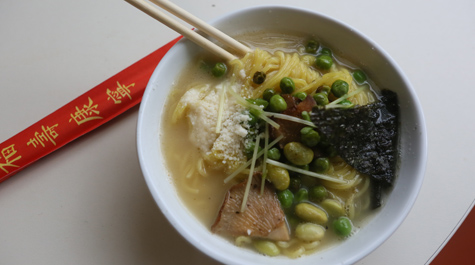Two W&M classes face off in cooking competition
The bustling Boehly Café in William & Mary's Raymond A. Mason School of Business wasn’t filled with business students and faculty on the evening of Dec. 3. Instead, students from across campus sat in groups at the handful of tables with dishes of food, anxiously waiting to present their meals before a table of foodie professionals.

Stephen Sheehi, Sultan Qaboos bin Said Chair of Middle East Studies and director of the Asian and Middle East Studies program, organized the "Great W&M Asia Cook Off." He brought in celebrity chef Katsuya Fukushima, chef and co-owner of Daikaya-Izakaya, Haikan and Bantam King, and restaurateur Yama Jewayni, co-owner of Daikaya-Izakaya, Haikan, Bantam King and more, to judge the cooking competition between two of his classes, Arab 150: The History of Arab Food and AMES 385: AMES-APIA East Asia Think Tank.
“It was basically a dream team of the award-winning chef and the award-winning restaurateur all coming together,” said Sheehi.
The East Asia Think Tank class is a required part of the Freeman East Asia Fellowship program at W&M, which was established through a grant from the Freeman Foundation to the Asian and Middle East Studies Program and the Asian and Pacific Islander American Studies Program. That grant enabled 20 students to participate in internships in East Asia last summer; all of those Freeman Fellows are in the think tank class this fall. The Freeman Foundation recently provided the university $100,000 to support a second year of the internships.
{{youtube:medium:left|ikXvzmLxwsY}}
With 12 groups comprised of three students each, Sheehi tasked each group to include the secret ingredient — eggplant — into their dishes. But that wasn’t where their endeavor ended.
“Part of what I’m also trying to do is experiential,” said Sheehi, referring to the educational aspect of the competition. He taught his students about the history, geographical route and cultural significance of dishes in each respective region of the world.
“I think that’s really how I started off the class, saying that what you sit in front of you, you have a whole historical trajectory behind that dish. You have a whole economic configuration behind that dish,” said Sheehi. “We started off with that precept, why not finish off with that?”
 Sam Desmaris ’20's group, which included of Suzie Bae ’20 and Hana Warner ’20, prepared gaji-namul, a Korean eggplant side dish.
Sam Desmaris ’20's group, which included of Suzie Bae ’20 and Hana Warner ’20, prepared gaji-namul, a Korean eggplant side dish.
“The class was broken down in week-by-week topics, so everything from transnational feminist networks to diffusion of food and culture,” said Desmaris.
Students went before the judges one group at a time with prepared speeches about the history and cultural impact of each dish. They had portions of their dishes ready for the judges to eat, whereupon Fukushima and Jewayni would jot down notes about each dish.
 Finally, it was the moment they all had been waiting for. Fukushima and Jewayni announced the winners after an evening of presentations: sikbaj, a classical Abassid Arab dish, part of a whole genre of dishes that are now no longer extant. The recipe was taken from a 14th century Arab recipe book.
Finally, it was the moment they all had been waiting for. Fukushima and Jewayni announced the winners after an evening of presentations: sikbaj, a classical Abassid Arab dish, part of a whole genre of dishes that are now no longer extant. The recipe was taken from a 14th century Arab recipe book.
Fukushima even said he would want the recipe from the student group so he could recreate the dish. With a round of applause, the celebrity food professionals presented three silver spatulas to the student winners. While the students tried each other’s dishes, the two chefs went into the Boehly Café kitchen to prepare a food presentation.
“It was cool to tie it into our discussion of the class and take it in a new direction,” said Desmaris. “Also I’ve never cooked gaji-namul before so it was a wild experience.”
 Skip to main content
Skip to main content




